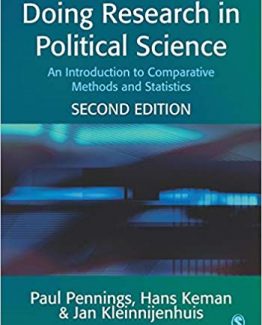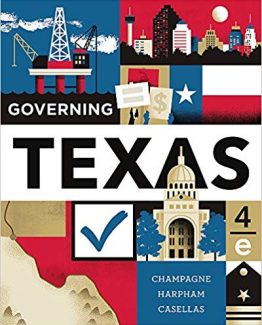Political Ideologies and the Democratic Ideal 11th Edition by Terence Ball, ISBN-13: 978-0367235116
[PDF eBook eTextbook]
- Publisher: Routledge; 11th edition (July 31, 2019)
- Language: English
- 426 pages
- ISBN-10: 0367235110
- ISBN-13: 978-0367235116
Political Ideologies and the Democratic Ideal analyzes political ideologies to help readers understand individual ideologies, and the concept of ideology, from a political science perspective. This best-selling title promotes open-mindedness and develops critical thinking skills. It covers a wide variety of political ideologies from the traditional liberalism and conservatism to recent developments in liberation politics, the emergence of the Alt-Right, and environmental politics.
NEW TO THIS EDITION:
- Focus on the recent rise of populism and an “illiberal democracy” and how this poses a real challenge to the pillars of Western Liberal democracy;
- A look at early Conservatives and the idea of “natural aristocracy” with focus on the thoughts of Edmund Burke;
- A new discussion on whether Donald Trump is really a conservative, and if so, to what extent this is true;
- An expanded look at Stalinism and the apparent rebirth of “Mao Zedong thought” in China through “Xi Jinping thought”;
- A more in-depth look at the rise of Hitler and the Nazi Party and how “myth” was crucial to legitimizing both the man and the party;
- New section on the history of American Fascism, from its origins to the recent emergence of the “Alt-Right”;
- Expansion of the discussion around the recent protest movements Black Lives Matter, and #MeToo, along with the repercussions of these movements;
- Discussion on the obstacles facing transgender people implemented in recent years, including the bathroom laws and the ban from US military service;
- Account of how Donald Trump has galvanized the environmental movement like never before, through his ardent anti-environment policies and appointments;
- In-depth look at how the effects of climate change are increasingly turning people into “environmental migrants” and how the presence of these people has fueled far-right movements across Europe and the US;
- Additional photos throughout;
Table of Contents:
- Cover
- Half Title
- Title
- Copyright
- Dedication
- BRIEF CONTENTS
- CONTENTS
- PREFACE
- TO THE READER
- Part One Ideology and Democracy
- Chapter 1 Ideology and Ideologies
- Why Political Ideology?
- A Working Definition of “Ideology”
- Human Nature and Freedom
- Human Nature
- Freedom
- Ideology and Revolution
- Nationalism, Populism, and Anarchism
- Nationalism
- Populism
- Anarchism
- Conclusion
- Chapter 2 The Democratic Ideal
- The Origins of Democracy
- Democracy and Republic
- The Republic and Mixed Government
- Christianity and Democracy
- Renaissance and Republicanism
- The Atlantic Republican Tradition
- The Return of Democracy
- Seventeenth-Century Democrats
- The United States as Democratic Republic
- Tocqueville on Democracy
- The Growth of Democracy
- Democracy as an Ideal—And in Practice
- Four Conceptions of Democracy
- Conclusion
- Part Two The Development of Political Ideologies
- Chapter 3 Liberalism
- Liberalism, Human Nature, and Freedom
- Historical Background
- Medieval Origins
- The Protestant Reformation
- Liberalism and Revolution
- England
- The American Revolution
- The French Revolution
- Liberalism and Capitalism
- Adam Smith
- Liberalism in the Nineteenth Century
- Utilitarianism
- Liberalism Divided
- Neoclassical Liberalism
- Welfare Liberalism
- Liberalism in the Twentieth Century
- Historical Developments
- Philosophical Considerations
- The Libertarian Vision
- Liberalism Today: Divisions and Differences
- Conclusion
- Liberalism as an Ideology
- Liberalism and the Democratic Ideal
- Coda 1: The Limits of Liberal Toleration
- Coda 2: A New New Deal?
- Coda 3: The “Occupy” Movement
- Chapter 4 Conservatism
- The Politics of Imperfection
- The Conservatism of Edmund Burke
- Human Nature
- Freedom
- Revolution and Reform
- Burke on Government
- Burke’s Legacy
- Conservatism in the Nineteenth Century
- Conservatism and Reaction
- Tory Democracy
- Conservatism in the United States
- Conservatism in the Twentieth Century
- Conservatism Versus Mass Society
- Levelling
- Conservatives and Communism
- Conservatism Today: A House Divided
- Traditional Conservatism
- Individualist Conservatism
- Neoconservatism
- The Religious Right
- “Fusionist” Conservatism
- Conclusion
- Conservatism as an Ideology
- Conservatism and the Democratic Ideal
- Chapter 5 Socialism and Communism: From More to Marx
- Human Nature and Freedom
- Socialism: The Precursors
- Saint-Simon
- Fourier
- Owen
- The Socialism of Karl Marx
- The Young Marx
- The Influence of Hegel
- Marx’s Theory of History
- Marx’s Critique of Capitalism
- Marx’s Theory of Revolution
- The Revolutionary Sequence
- Chapter 6 Socialism and Communism After Marx
- Marxism After Marx
- Engels’s Marxism
- The Revisionists
- Soviet Marxism-Leninism
- Chinese Communism
- Maoism’s Influence Abroad
- North Korea
- Critical Western Marxism
- Non-Marxist Socialism
- Anarcho-Communism
- Christian Socialism
- Fabian Socialism
- American Socialism
- Socialism Today
- Conclusion
- Socialism as an Ideology
- Socialism and the Democratic Ideal
- Chapter 7 Fascism
- Fascism: The Background
- The Counter-Enlightenment
- Nationalism
- Elitism
- Irrationalism
- Fascism in Italy
- Mussolini and Italian Fascism
- Fascism in Theory and Practice
- Fascism in Germany: Nazism
- Hitler and Nazism
- Nazism in Theory and Practice
- Human Nature and Freedom
- Fascism Elsewhere
- Fascism Today
- Fascism in America
- The “Alt-Right”
- Conclusion
- Fascism as an Ideology
- Fascism and the Democratic Ideal
- Part Three Political Ideologies Today and Tomorrow
- Chapter 8 Liberation Ideologies and the Politics of Identity
- Liberation Ideologies: Common Characteristics
- Black Liberation
- Women’s Liberation (Feminism)
- Gay Liberation (LGBT)
- Native People’s Liberation (Indigenism)
- Liberation Theology
- Animal Liberation
- Conclusion
- Liberty, Identity, and Ideology
- Liberation, Identity, and the Democratic Ideal
- Chapter 9 “Green” Politics: Ecology as Ideology
- The Green Critique of Other Ideologies
- Toward an Ecological Ethic
- Unresolved Differences
- Conclusion
- Ecology as Ideology
- Ecology, Freedom, and the Democratic Ideal
- Coda: The End of Environmentalism?
- Chapter 10 Radical Islamism
- Islam: A Short History
- Radical Islamism
- The Rise of ISIS
- Human Nature and Freedom
- Conclusion
- Radical Islamism as an Ideology
- Radical Islamism and the Democratic Ideal
- Chapter 11 Postscript: The Future of Ideology
- Political Ideologies: Continuing Forces
- Nationalism and Ideology
- Religion and Ideology
- Ideology and Public Policy
- Ideology, the Environment, and Globalization
- Political Ideologies and the Democratic Ideal
- The End of Ideology?
- Glossary
- Name Index
- Subject Index
TERENCE BALL received his Ph.D. from the University of California at Berkeley and is now Emeritus Professor of Political Science and Philosophy at Arizona State University. He taught previously at the University of Minnesota and has held visiting professorships at Oxford University, Cambridge University, and the University of California, San Diego. His books include Transforming Political Discourse (1988), Reappraising Political Theory (1995), and a mystery novel, Rousseau’s Ghost (1998). He has also edited The Federalist (2003), James Madison (2008), Abraham Lincoln: Political Writings and Speeches (2013), and coedited The Cambridge History of Twentieth-Century Political Thought (2003).
RICHARD DAGGER earned his Ph.D. from the University of Minnesota and has taught at Arizona State University and Rhodes College, and the University of Richmond, where he is currently the E. Claiborne Robins Distinguished Chair in the Liberal Arts. He is the author of many publications in political and legal philosophy, including Civic Virtues: Rights, Citizenship, and Republican Liberalism (1997) and Playing Fair: Political Obligation and the Problem of Punishment (2018).
DANIEL I. O’NEILL holds a Ph.D. from the University of California at Los Angeles and is now Associate Professor of Political Science at the University of Florida. He is the author of The Burke-Wollstonecraft Debate: Savagery, Civilization, and Democracy (2007), coeditor of Illusion of Consent: Engaging with Carole Pateman (2008), and author, most recently, of Edmund Burke and the Conservative Logic of Empire (2016) .
What makes us different?
• Instant Download
• Always Competitive Pricing
• 100% Privacy
• FREE Sample Available
• 24-7 LIVE Customer Support






Reviews
There are no reviews yet.